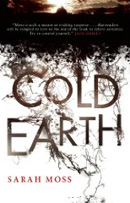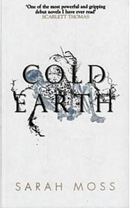


Counterpoint, paperback, 9781582435794
Granta, paperback, 9781847080608
'University academics' is not a phrase which generally conjures up thoughts of excitement, thrills and life-threatening danger. The runaway success of Donna Tartt's 1992 novel The Secret History, however, threw a new light on this particular section of society. Higher education has become a popular choice for writers looking to explore the dynamics of a tight-knit group of eccentrics with esoteric interests and emotional intensity issues.
Sarah Moss's Cold Earth is a particularly fine entry in this genre. A small group of six academics are in Greenland for a dig run by the obsessive, brilliant and astoundingly impractical Yianni. Not all are archaeologists: Catriona is a painter, hoping for inspiration, while Nina is a postgrad in literature. Nina dominates the book: more than half of it is told through her eyes, in the form of a 'letter home' to her partner, and our first meetings with the other members of the team are filtered through her perspective. Even when narration passes to the other characters, the problem of 'what to do about Nina' is a major preoccupation. Struggling to sleep in the long Arctic day, and against her fears of isolation, Nina is having terrifying visions of an ancient Scandinavian settlement torn apart by violence.
As the dreams begin to bleed into her waking life, "[opening] the contested border between one's worst imaginings and les actualités", Nina's behaviour becomes ever more erratic. The camp is convinced she's going mad, but to the reader, it's increasingly clear that something more sinister is going on. Boots are moved, tents opened, stones thrown, boats appear unexpectedly with apparently no one in them, figures are seen on hillsides where there should be no one. As Catriona says, "it's like trying not to watch a scary film, sometimes, round here."
Moss pulls off the rare trick of forcing the reader to care about a group of essentially fairly unpleasant and self-centred characters. Nina is neurotic and obsessive, Yianni dogmatic and impractical, Ruth abrasive and critical, and so on. Yet as she draws the noose tightly in around her characters, Moss makes their fears our fears: each speaks directly to us, with the reader taking the place of absent partners and family.
The pacing of Cold Earth is superbly controlled: it glosses over the minutiae of archaeology, pausing briefly when a detail discovered can shed light on the present-day interactions of the small group. Cold Earth makes archaeology the perfect metaphor as it puts human motivation under the microscope; in Nina's words, "archaeology is reading, just earth rather than text."
A strong theme in the book is mankind's infinite genius for exterminating itself. Beyond
the Greenland dig, the mysterious virus that was making headlines when the team flew out
is spreading fast. The six fear for the welfare of friends and family left behind, but the
impact on them is more deadly: as the outside world is increasingly affected, their
communication lines are shutting down. Besides viral pandemics, climate change
(both present-day and in the settlement) is namechecked; tribal violence, terrorist attacks
and personal tragedy on the smaller scale of a traffic accident are also present and
correct. In Ruth's words, Cold Earth concludes that "there's no hierarchy of loss
with terrorism higher up than road traffic accidents. Comes he slow or comes he fast,
death is the same for everyone."
Download this page as a pdf